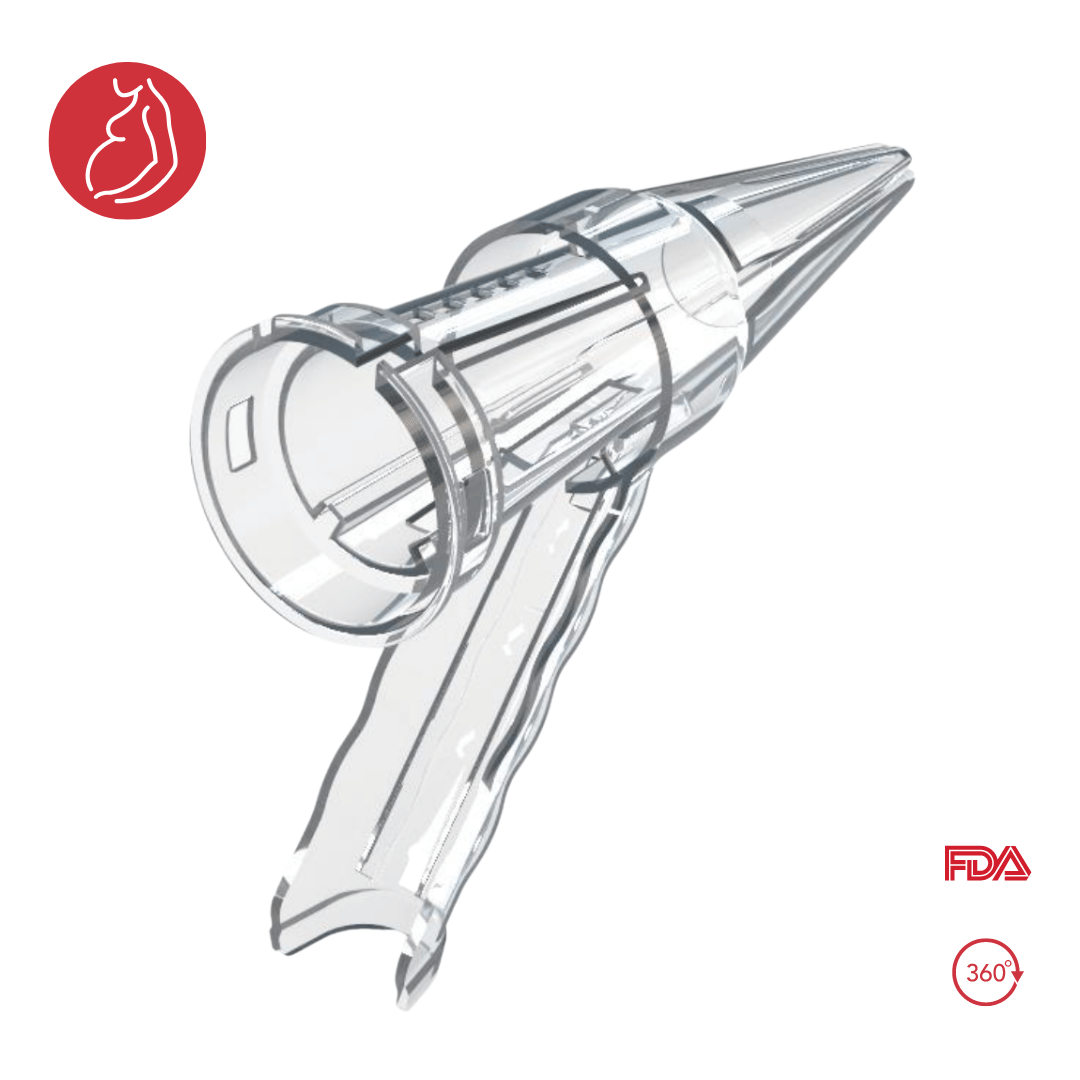

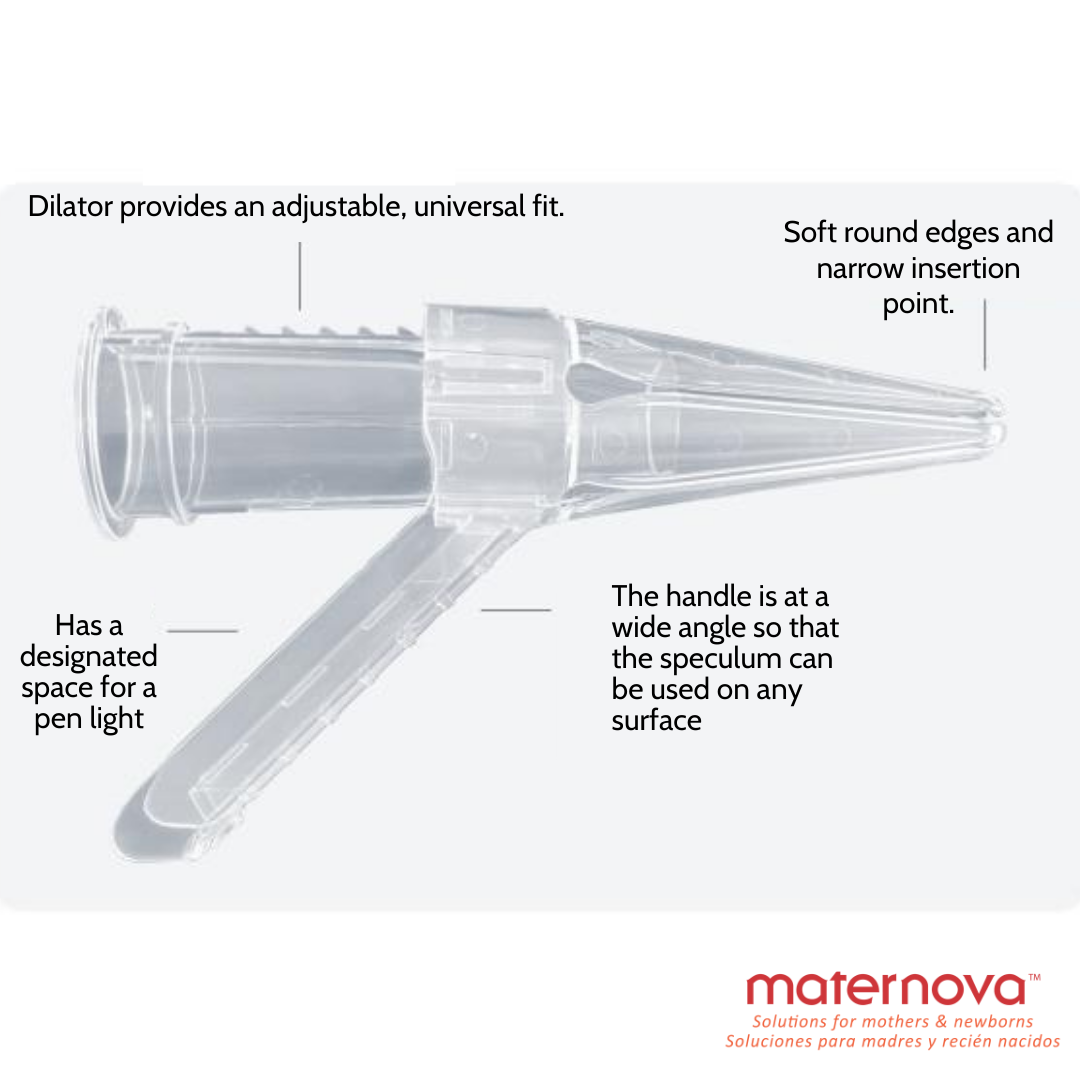
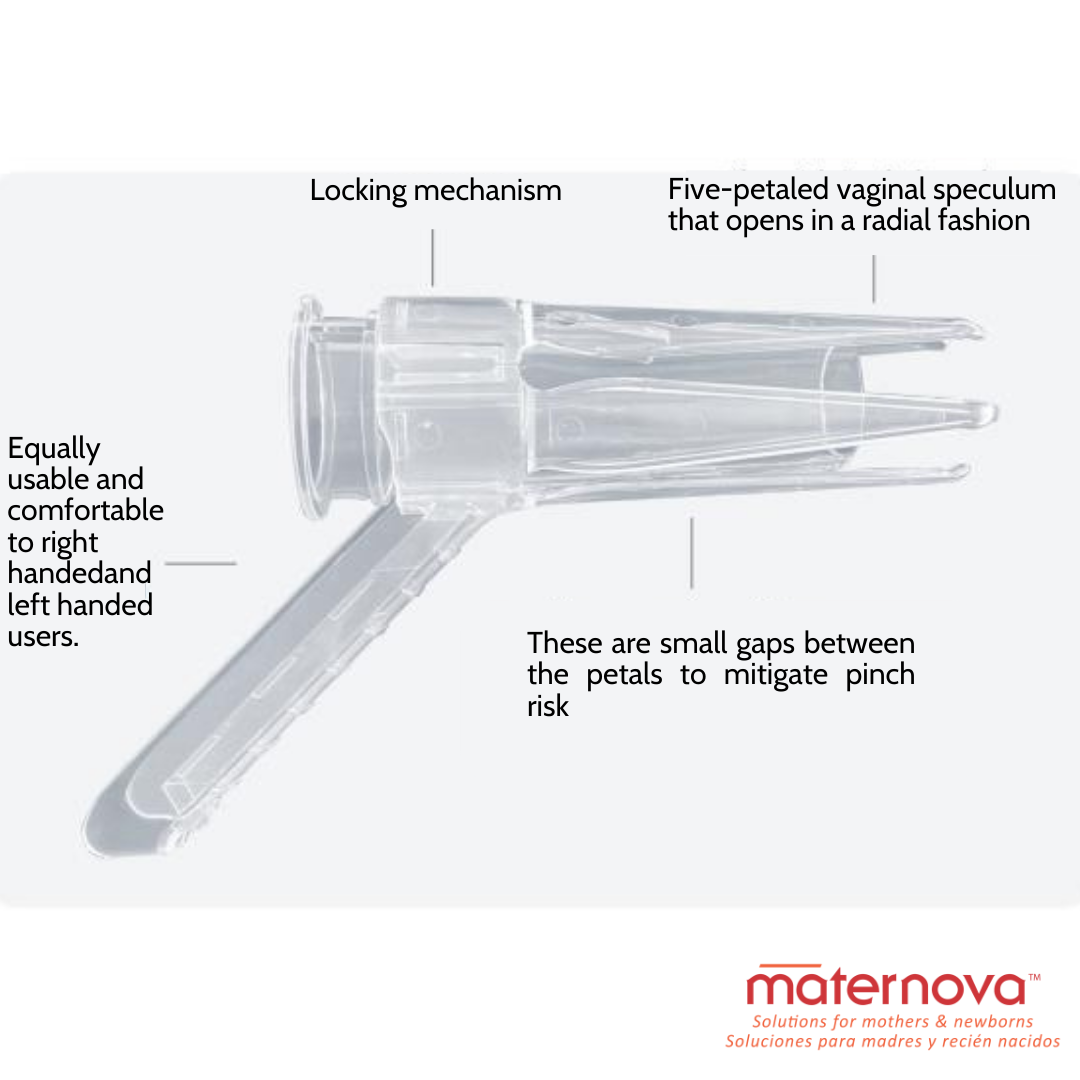
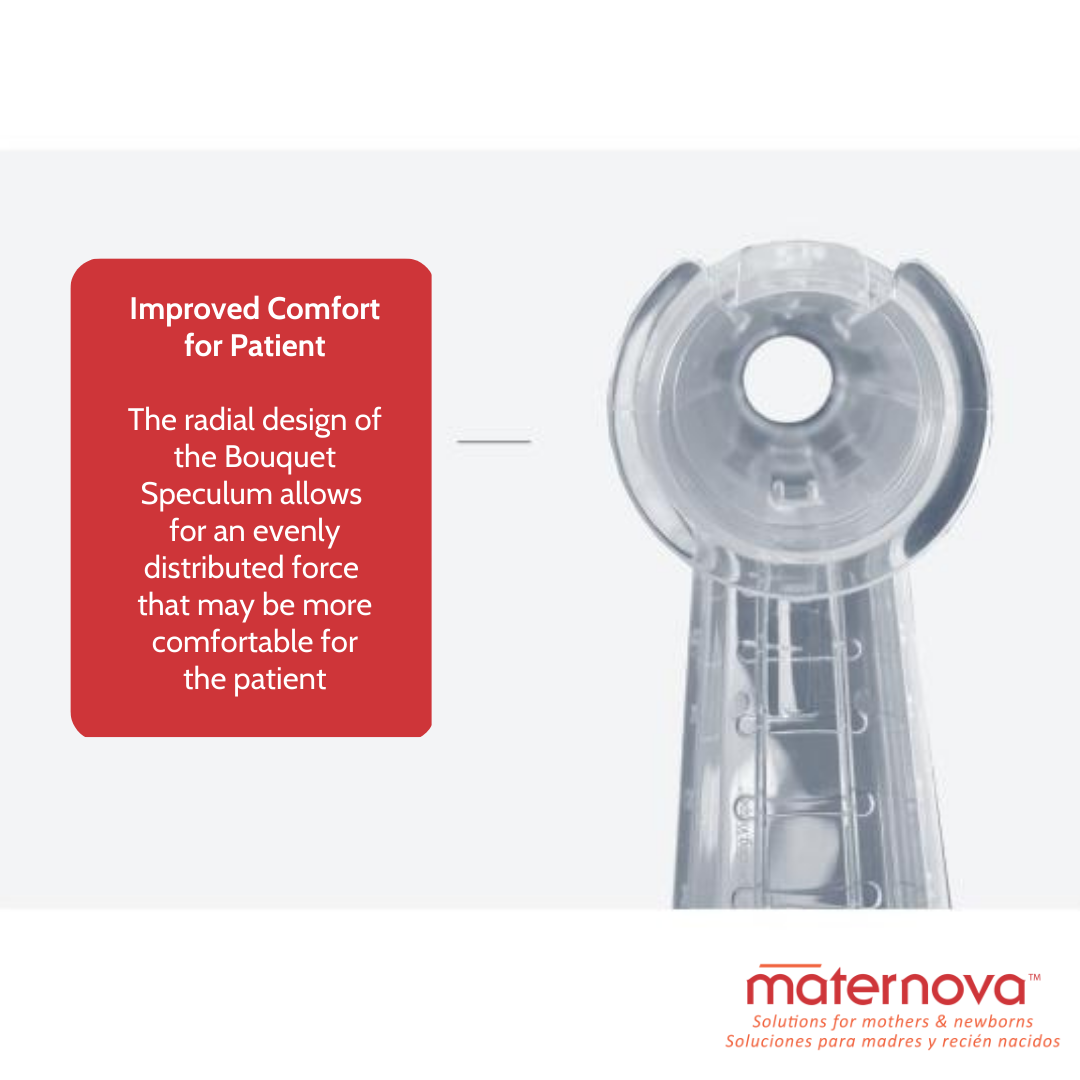
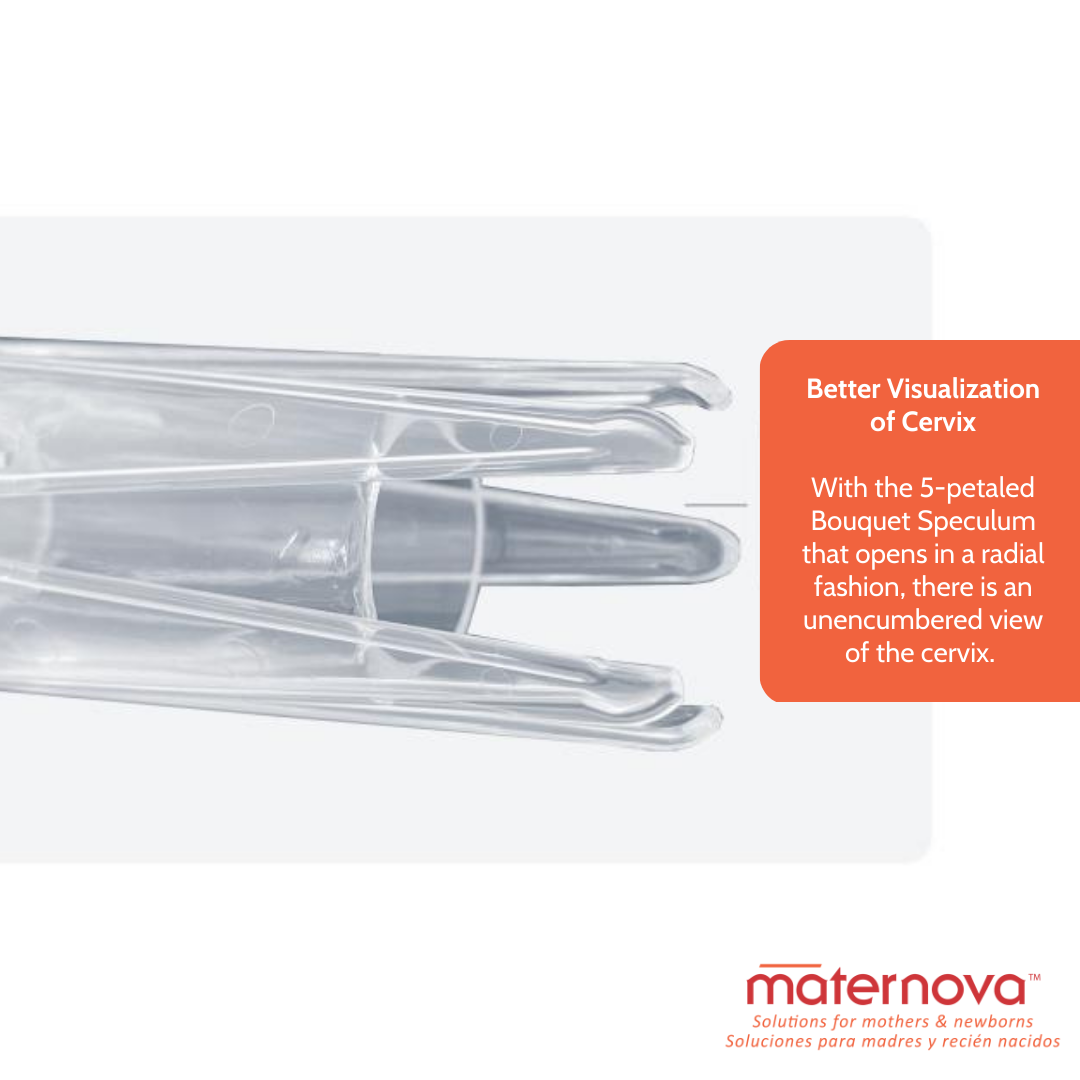

Bouquet Speculum™
-
Where is the price?
Pricing is based on shipping location and the number of units ordered. To request a price, please use the Request a Quote button below. A sales representative will respond to you quickly.
Bouquet Speculum™: a revolutionary 360 degree view of the cervix
The first mention of vaginal specula goes back to the ancient Greeks and Romans and they are assumed to have been used for the past 2000 years. In the nineteenth century, J. Marion Sims developed the modern vaginal speculum, a two-petal device with rounded ends shaped like a duck-bill. While medicine in general, and also gynecology specifically, improved a lot in the past 2000 years, the vaginal speculum has not changed much for decades. Following Sims, specula were made out of glass, metal, or stainless steel for easier sterilization. At the end of the 20th century, plastic specula were produced and used, most of which were single-use. However, the design that Sims introduced remained largely unchanged.
While the duck-billed speculum was a great invention at its time, it still has many challenges. The provider needs to store different size specula depending on the patient’s parity, reproductive status, and weight/ Body Mass Index and experiences the collapsing of vaginal walls in multiparous and obese women. They cannot completely visualize the cervix, as redundant areas of the vaginal wall might cover it, leaving the examination unsatisfactory. Further, the provider must have a gynecological examination chair for optimal speculum placement and visualization.
The patients may experience vaginal pinching when the duck-billed speculum is closed during removal, can experience discomfort and pain when a non-appropriate speculum size is used, and may have emotional feelings of vulnerability during extended examinations when the cervix cannot be visualized sufficiently.
These challenges motivated Dr. Bouquet, a family physician, to invent a novel plastic, single-use speculum, that opens up radially, holding back the vaginal walls evenly with its 5 petals. This innovative mechanism prevents collapsing of the vaginal walls and allows for an unobstructed view of the complete cervix, faster than commonly used specula allowed. A reusable pen-size LED light can be attached to the speculum’s handle and optimizes the visualization of the cervix. This mitigates the need for a floor lamp that must be continually repositioned to see all of the anatomy.
With its petal-locking mechanism on the interior dilator, the speculum allows the clinician to perform cervical procedures without an assistant. Once the petals are in the correct opening position and the cervix is seen, the provider stabilizes the handle in one hand and performs the necessary procedure with the other one. Additionally, the circumference and depth of the speculum insertion can be adjusted to the patient’s anatomy, so that only one size speculum is needed at the provider’s office. The speculum handle is attached at a 135-degree angle that allows its use in other clinical scenarios such as examination on stretchers and hospital beds (which was not possible with the commonly used duck-billed specula and their 90-degree handle).
In preliminary studies, patients confirmed an improved comfort level during the examination.
How does the Bouquet Speculum work?
In principle, the Bouquet Speculum works like any other speculum, which keeps the vaginal walls exterior to its petals. However, this innovative device is more provider and patient friendly through its unique design. The Bouquet Speculum consists of 3 elements:
- A 5- petal, rounded vaginal speculum that is connected to a 135-degree angled handle
- A dilator (a piece unique to the Bouquet Speculum) that fits inside the speculum and is deployed (pushed forward towards the cervix) after the petal tip of the speculum has been positioned at the cervix. Once adequate visualization is achieved, the dilator is locked by the ridges at the 12 o’clock position.
- A removable, reusable LED pen light. (Ordered separately)
Product and ordering information
The Bouquet speculum is sold in cases of 20 per box.
Minimum order quantity is 5 cases in the U.S.
Minimum order quantity is 20 cases worldwide (except the U.S.)
Reusable torch light, ordered separately.
Regulatory approval information
This device is FDA cleared and manufactured in an ISO 13485 certified facility.
FAQ:
When do you use the Bouquet?
The Bouquet speculum is ideal for cervical exams including visualization of the cervix, pap smears, colposcopy, visual Inspection with acetic acid (VIA- a screening method for early detection of cervical lesions) including treatment of cervical lesions (e.g. Cryotherapy, LEEP). The Bouquet Speculum can also be used for cervical swab tests to determine the presence of HPV or other STIs, or for examinations in cases of trauma or rape.
Who can use the Bouquet?
Healthcare providers who are trained in vaginal/pelvic exams to visualize the cervix can use the bouquet speculum. This includes midwives, nurses, doctors, and emergency workers.
What’s the age range?
Because it opens concentrically and gradually (as opposed to the traditional two valve speculums) the circumference and the depth of the speculum insertion can be adjusted to the patient’s anatomy, so that just one size of the speculum adjusts to all patients Bouquet Speculum can be used in almost any patient, there are no age limits.
What are the specifications of the light source?
The pen light is a 12 mm stainless steel rechargeable LED light that snaps directly into the handle of the speculum and can be reused multiple times. The pen light can be recharged through a USB connector.
Note: This pen light is ordered separately.
What are the Step-by-step instructions for the use of a Bouquet speculum?
Step 1: Open the plastic cover and remove the speculum. Remove the flap that keeps the Dilator from moving, discard.
Step 2: Snap the LED pen light into the handle of the speculum so that the light source is pointing toward the petals; it needs a bit of force to snap it in securely. Slide the switch forward when you want to turn the light on
Step 3: Lubricate the speculum with a water-based lubricant.
Step 4: Fully retract the dilator before initiating the exam.
Step 5: Insert the Bouquet speculum into the vagina (following anatomy) until resistance is felt, tilting slightly posteriorly if the patient is supine or in the lithotomy position.
Step 6: Slowly open the device by pushing the dilator inwards until you can see the cervix completely, the dilator ridges on the lever (at 12 o’clock) will keep the petals open at the desired circumference.
Step 7: To retract the dilator, carefully release the dilator lever by pushing down (at ‘12 o’clock’ on the dilator) while slowly removing the dilator from the inside of the speculum (this prevents a sudden closure of the petals). The slow speculum removal while keeping the petals slightly extended allows for the visual inspection of the vaginal wall. Note that the speculum petals might close quickly and could lead to an uncomfortable patient experience if the dilator is not kept in position (e.g. holding it with the index finger) while releasing the dilator lever. Gently remove the speculum and close the petals once the speculum is removed. This can be done with one hand.
Step 8: Remove the LED pen light from the handle, recharge it if needed, and dispose the speculum.
Where has the Bouquet been used?
The Bouquet speculum has been extensively used with key clinicians in Kenya and Cameroon who are dedicated to Cervical Cancer prevention and treatment and to assure women have access to adequate and respectful gynecologic care. Their positive feedback and excitement about using the Bouquet speculum is improving their patient’s experience and streamlining clinic operations. The Bouquet speculum was also used in trials at Rocky Vista University with favorable feedback.
Product materials and instruction documents
Maternova Instructions For Use (IFU) are available in English and Spanish.
📄 - Download our 2 page pamphlet
Article from Journal of Women's Healthcare - A New Vaginal Speculum and an Inexpensive Kit to Screen and Treat Dysplasia and Cancer of the Cervix







